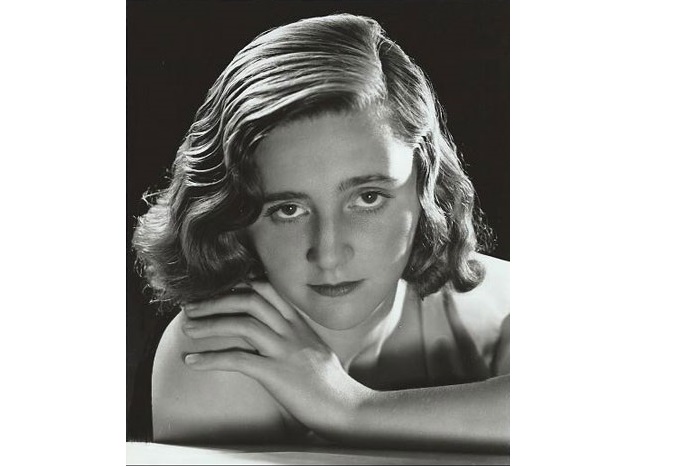
20: Helen Perkin: (1909 - 1996)
Helen Perkin remains a curiously transitory, almost anomalous figure in the history of the brass band movement.
A remarkable pianist blessed with gifts that should have propelled her to become a significant figure of the post war British musical landscape, instead her life, according to the academic researcher Fiona Richards, was one that was to become “heavily influenced by the spirit of the ages, people and places she crossed…”
As a result, during her lifetime an ephemeral compositional link based on two works used at the British Open Championships had long since been broken and discarded by decades of unappreciated neglect.
On her death in Australia in 1996, even the substantial musical achievements of her youth, when she commanded both the focus and plaudits of concert goers, critics and composers alike had almost completely faded from memory.
Instead, her obituary spoke of her devoted commitment to the rather mysterious Gurjieff spiritual movement, one which although giving her great personal happiness, left others feeling as if it had denied her talents their true fulfilment.
Musical talent
Helen Craddock Perkin was born in Hackney in February 1909. Her father was an architect, whilst her mother had studied as a pianist at the Royal College of Music (RCM). Helen’s musical talent was obvious at an early age, winning Associated Board Gold Medals in 1923 and 1925.
Following the death of her mother she entered the RCM in 1926 to study under Arthur Alexander. There she met and was taught composition by John Ireland (1879-1962), who reported that her work was ‘fresh and interesting’.
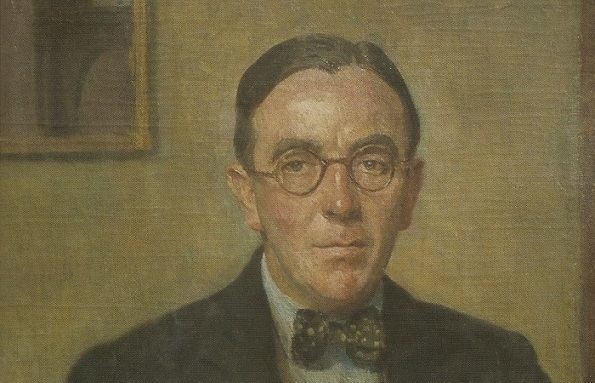
Perkin's link to composer John Ireland lasted over 30 years in various ways
Defining association
It was to become a defining association – and one that over its 30-year arch has posed major debate amongst historians. Fiona Richards described it as “intense”, with him “as the revered teacher, she the beautiful young muse.”
Other were certainly stricken by her. The writer Sylvia Townsend Warner described Perkin as “a very beautiful serious child”, her musical talents match by her looks, which another said was “fine boned, delicate, dark hair in a coil in the nape of a slender neck, and classical features.”
Ireland’s link to the banding movement had gained critical acclaim following the use of ‘A Downland Suite’ at the National Championships in 1932; his own star in an ascendency that was to retain high orbit following the use of ‘Comedy’ two years later.
Deeply complex
The companionship with Ireland was based somewhat on circumstance (both lost a parent at a young age), but also on a desire to explore a wider musical hinterland; the emerging French school of impressionism, Chopin, Liszt, Ravel but also the likes of lesser-known British composers such as Szymanoski.
Ireland’s link to the banding movement had gained critical acclaim following the use of ‘A Downland Suite’ at the National Championships in 1932; his own star in an ascendency that was to retain high orbit following the use of ‘Comedy’ two years later.
He was however a deeply complex man; troubled and introspective, his relationships with women, equally as problematic and unsettled.
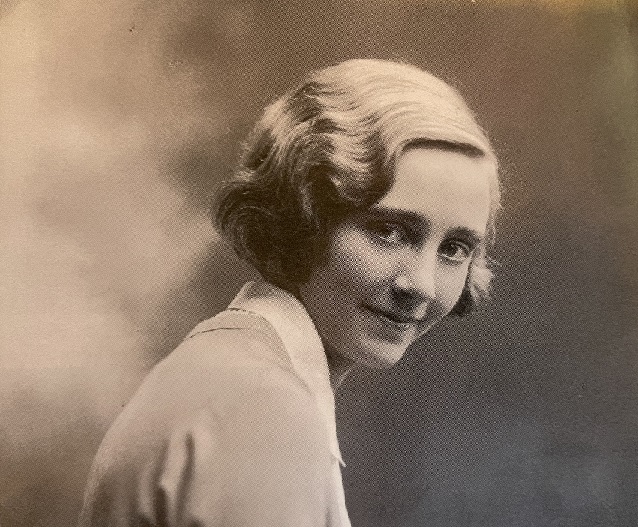
The young Helen Perkin
Acclamation
At first though, the link between the pair in the early 1930s brought increasing acclamation.
He had already dedicated works to her, including his famed ‘Piano Concerto’. Following its premiere at the 1930 Proms both reached new heights. ‘The Daily Telegraph’ described it as a “revelation”, Perkin praised as a pianist “to the highest degree”.
In 1934 she premiered Ireland’s ‘Legend’ for piano and orchestra at Queen’s Hall, London. It was arguably to be the high-water mark of their musical as well as personal relationship.
He had already dedicated works to her, including his famed ‘Piano Concerto’. Following its premiere at the 1930 Proms both reached new heights. ‘The Daily Telegraph’ described it as a “revelation”, Perkin praised as a pianist “to the highest degree”.
Her own work had flourished; a quartet winning the prestigious Cobbett Chamber Music prize (following in Ireland’s footsteps), her style developing the type of dense contrapuntal structures reminiscent of Ireland’s writing (and certainly found in her later ‘Phantasy’); the rich textures and harmonic bridges, modal harmonies and strong melodic presence easy on the ear.
Plaudits
By 1931 she had won a plethora of plaudits and awards both at home and abroad. Her ‘Piano Trio’ was performed at the Societe National in Paris. The reviewer Rollo Myers said; “To call it brilliant would be misleading, for it reveals a genuine and imaginative musical temperament”.
Perkin’s appearances at the Proms spanned the period 1930 to 1937 where she performed Ireland’s Concerto three times as well as works by Prokofiev, Haydn and Beethoven.
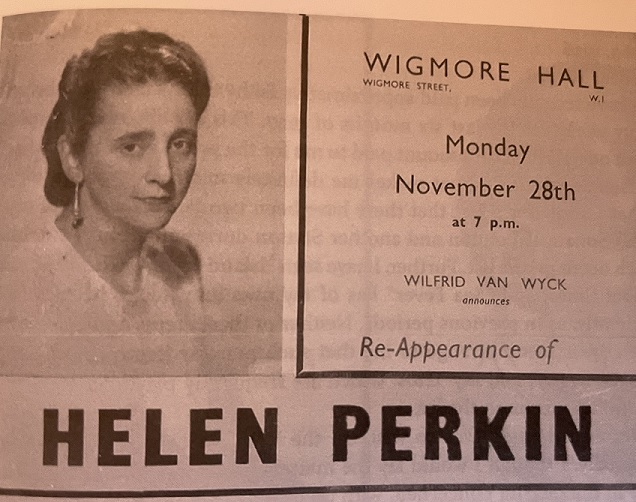
Perkin was a popular performer on the most important stages
Seismic moment
In 1935 she married architect George Mountford Adie (1901-1989). Three children followed.
It was a seismic moment for Ireland. Shocked and feeling rejected, the darkest elements of his personality emerged. What followed is sympathetically documented through the excellent research of Fiona Richards, who wrote that the friendship “had been a demanding and possessive one”.
Poisonous
Ireland’s bile was almost poisonous. He wrote to his sister to say that “she had detached herself from me.” Looking back in 1962, Perkin said that “the situation became so impossible that a complete break had to be made”.
The rift never healed, (Ireland removed his dedication to her from the ‘Piano Concerto’, whilst he later wrote to her to say that she had become “intensely ego-centric”) although her compositions still retained flecks of his compositonal DNA.
The rift never healed, (Ireland removed his dedication to her from the ‘Piano Concerto’, whilst he later wrote to her to say that she had become “intensely ego-centric”) although her compositions still retained flecks of his compositonal DNA.
After the Second World War Helen Perkin’s performing career maintained a significant profile, and although by no means as busy as before, her works also gained further acclaim.
In 1956 she produced a large scale ‘Cello Sonata’, whilst the BBC commissioned two ballets for children’s television. Her creativity was eclectic and clever, her writing informed and rigorous.
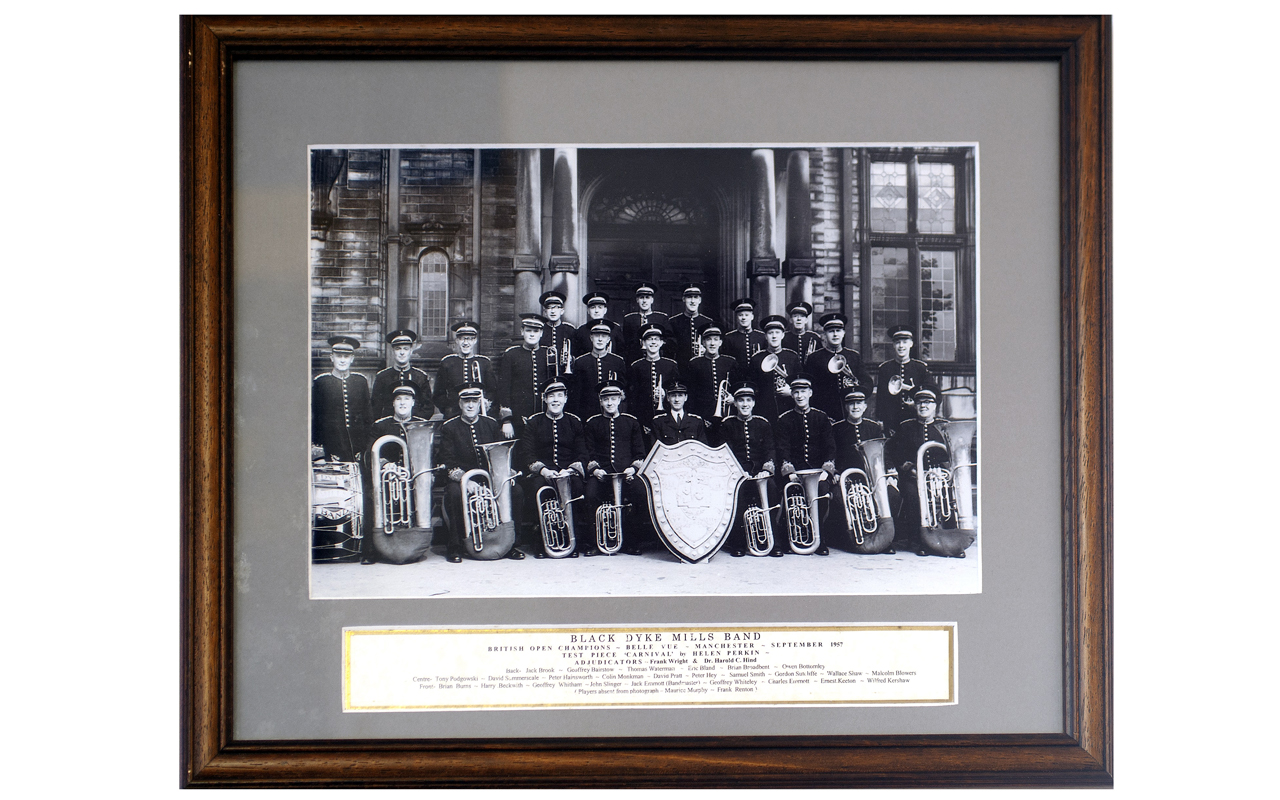
Black Dyke claimed the 1957 British Open title on 'Carnival'
Carnival
How she was asked to write ‘Carnival’ as the test-piece for the 1957 British Open remains a mystery though – and one that not even Fiona Richards’ fine research has managed to resolve.
With the likes of Harry Mortimer and Frank Wright influential figures at the BBC at the time, it is perhaps reasonable to assume they may have had some input.
However, Perkin later admitted that her scoring technique had been informed by Harold Hind’s publication ‘The Brass Band’ and that that Eric Ball had gone through her score “with a fine toothcomb”.
Interestingly, Frank Wright and Harold Hind were the judges at the contest, whilst Perkin, who was in attendance later stated that: “I can say with all sincerity that the Belle Vue contest was one of the most thrilling experiences in my life.
Interestingly, Frank Wright and Harold Hind were the judges at the contest, whilst Perkin, who was in attendance later stated that: “I can say with all sincerity that the Belle Vue contest was one of the most thrilling experiences in my life.
On that day, I entered a new world, of whose existence I was only just becoming aware. I was told at the end of the day that I had been ‘inoculated’ but I should say that ‘infected’ was a better word.”
Unfortunately, ‘Carnival’ did not make a lasting impression.
Out of step
Eric Ball as Editor of British Bandsman sympathetically called it; “a welcome addition to the all too small repertoire of original brass band works written by distinguished composers”.
However, its deceptive, stylised simplicity was out of musical step; the three movement ‘Cavalcade’, ‘Pavane’ and ‘Burlesque’, lacking the romanticised meatiness that was the overriding feature of the more popular major works of the time.
Ball later offered the sympathetic explaination that it was “not over difficult to play (and because of this it can pass into the general repertoire, and not remain unplayed, as so many more difficult works have done), nevertheless it provides technical demands enough to throw into relief the most efficient playing”.
However, its deceptive, stylised simplicity was out of musical step; the three movement ‘Cavalcade’, ‘Pavane’ and ‘Burlesque’, lacking the romanticised meatiness that was the overriding feature of the more popular major works of the time.
‘Carnival’ has since only been used at the Grand Shield in 1962, Third Section Finals in 1974 and for the Second Section Area Championships in 2007.
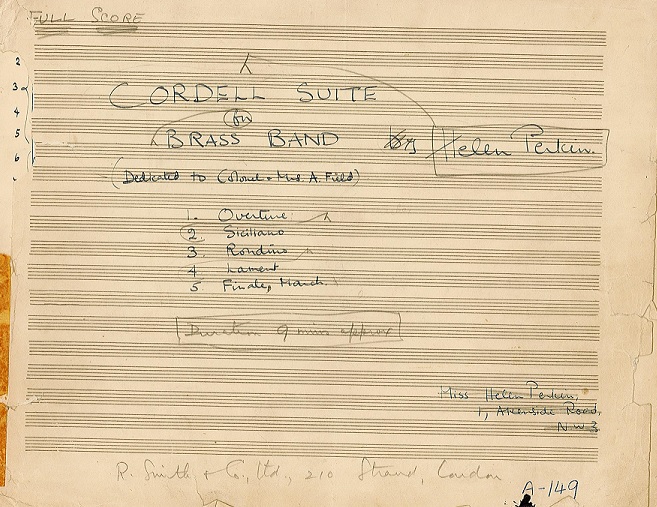
The handwritten score to 'Cordell Suite'
Cordell Suite
In 1959 her rather insubstantial ‘Cordell Suite’ was used at the Grand Shield. It was originally written in 1956 for horn and orchestra for her son’s school, and later bolstered into a five-movement suite dedicated to Colonel and Mrs A Field.
According to the note that accompanied its publication for the event it simply states that it “is music written purely for the pleasure of both performers and listeners”.
Clearly scored with an assured hand, a bright 3/2 ‘Overture’ leads into a delicate ‘Siciliano’ and waspish ‘Rondino’, before a lovely gem of a ‘Lament’ heralds a bright finale ‘March’.
According to the note that accompanied its publication for the event it simply states that it “is music written purely for the pleasure of both performers and listeners”.
It was used at the 1961 Third Section National Finals but soon faded into obscurity.
Island Heritage
So too, ‘Island Heritage’ which was commissioned for the 1962 British Open.
It also has no foreword, allowing as the programme note by Harry Mortimer stated, both performers and listeners alike to “stimulate the imagination, especially of those who love the sea.”
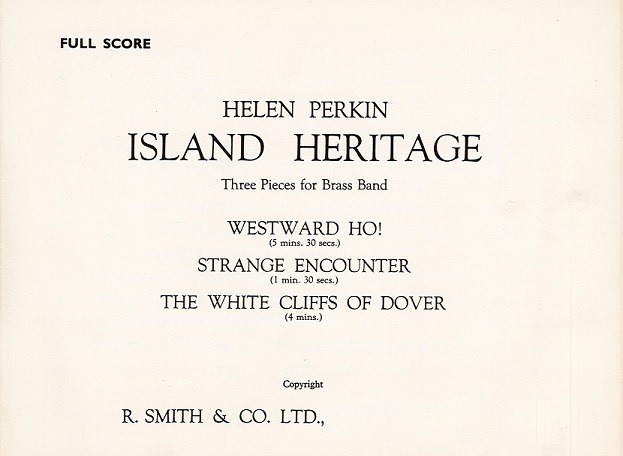
Perkin's third and final work for the brass band contest medium
Lost compass
However, even though he waxed lyrical about “a great full rigged ship setting out on a journey of adventure” with the opening ‘Westward Ho!', even he seemed to have lost his geographical compass with his description of the central ‘Strange Encounter’ as being “a story to tell of redskin braves perhaps”.
even he seemed to have lost his geographical compass with his description of the central ‘Strange Encounter’ as being “a story to tell of redskin braves perhaps”.
Mortimer hoped that ‘The White Cliffs of Dover’ to close would stimulate pictures of “the great ship in full sail, the West Wind now astern, ploughs majestically forward.”
Heady stuff – yet the work failed to live up to the hype.
Subtle writing
Perkin’s subtle writing style (later described by Eric Ball as “sensitive, often delicate, demanding an intimate ‘chamber music’ style of playing) once again seemed out of step of a time that as Mortimer himself stated was now in “the modern nuclear age.”
Helen Perkin was at the contest and received a warm welcome, but ‘Island Heritage’ has never been played at a major contest since.
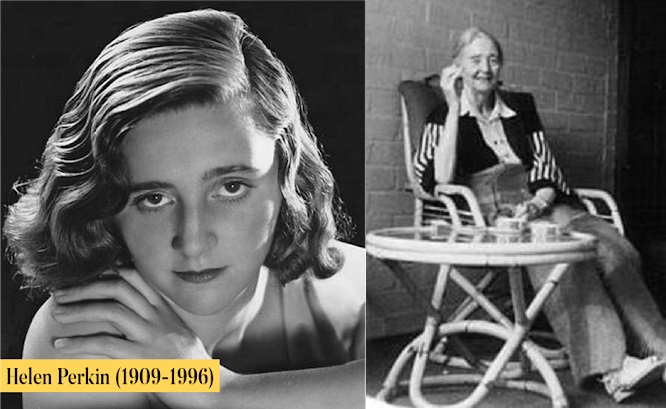
Elegant, intelligent and gifted
In 1965 the Perkin-Adie family emigrated to Australia, living in Sydney for the rest of their lives.
For a short time she resumed her playing career – even performing a work of John Ireland’s entitled, ‘The Towering Path’.
Commitment
Her commitment to the Gurdjieff movement though became ever more important – its spiritual teachings and music providing her with a vital role alongside her husband in its activities.
Even in her later years Helen Perkin-Adie performed music she had written for services and projects – aimed at bringing the “intellect, feeling and body into a harmonious state”.
Ailing health brought memory loss, and this most elegant, intelligent, and gifted of musicians died in 1996.
Iwan Fox
With grateful thanks to the research article of Fiona Richards entitled; ‘Helen Perkin: Pianist, Composer and Music of John Ireland’ published in ‘The John Ireland Companion’ (Boydell Press).
Additional information provided by Tim Mutum, Derek Rawlinson, and Mark Coull of R Smith and Co.
4BR Hall of Fame: No.1: Jack Atherton
https://www.4barsrest.com/articles/2019/1832.asp
4BR Hall of Fame: No.2: Albert Baile
https://www.4barsrest.com/articles/2019/1836.asp
4BR Hall of Fame: No.3: Stanley Boddington
https://www.4barsrest.com/articles/2019/1842.asp
4BR Hall of Fame: No.4: Bram Gay
https://www.4barsrest.com/articles/2020/1848.asp
4BR Hall of Fame: No.5: Leonard Lamb
https://www.4barsrest.com/articles/2020/1855.asp
4BR Hall of Fame: No.6: Arthur Stender
https://www.4barsrest.com/articles/2020/1866.asp
4BR Hall of Fame: No.7: Violet Brand
https://www.4barsrest.com/articles/2020/1871.asp
4BR Hall of Fame: No.8: Eric Bravington
https://www.4barsrest.com/articles/2020/1875.asp
4BR Hall of Fame: No.9: Norman Ashcroft
https://www.4barsrest.com/articles/2020/1879.asp
4BR Hall of Fame: No.10: Albert Chappell
https://www.4barsrest.com/articles/2020/1884.asp
4BR Hall of Fame: No.11: Betty Anderson
https://www.4barsrest.com/articles/2020/1889.asp
4BR Hall of Fame: No.12: Trevor Walmsley DFC
https://www.4barsrest.com/articles/2020/1897.asp
4BR Hall of Fame: No.13: Percy Code
https://www.4barsrest.com/articles/2020/1903.asp
4BR Hall of Fame: No.14: George Thompson MBE
https://www.4barsrest.com/articles/2020/1909.asp
4BR Hall of Fame: No.15: Willie Lang
https://www.4barsrest.com/articles/2020/1914.asp
4BR Hall of Fame: No.16: James Scott
https://www.4barsrest.com/articles/2021/1916.asp
4BR Hall of Fame: No.17: Jack Mackintosh
https://www.4barsrest.com/articles/2021/1922.asp
4BR Hall of Fame: No.18: Teddy Gray
https://www.4barsrest.com/articles/2021/1928.asp
4BR Hall of Fame: No.19: Rowland Jones
https://www.4barsrest.com/articles/2021/1932.asp













